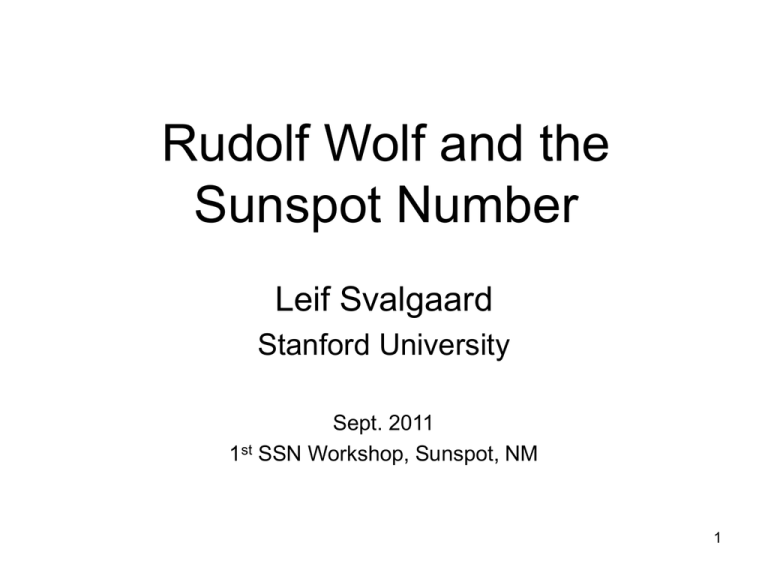Rudolf Wolf and the Sunspot Number
advertisement

Rudolf Wolf and the Sunspot Number Leif Svalgaard Stanford University Sept. 2011 1st SSN Workshop, Sunspot, NM 1 The Sunspot Number ~1856 • • • • Wolf Number = kW (10*G + S) G = number of groups S = number of spots kw = scale factor + site + personal factor Rudolf Wolf (1816-1893) Observed 1849-1893 2 The Sunspot Number • Wolf Number = kW (10*G + S) • G = number of groups • S = number of spots Rudolf Wolf (1816-1893) Observed 1849-1893 3 The Sunspot Number • Wolf Number = kW (10*G + S) • G = number of groups • S = number of spots Rudolf Wolf (1816-1893) Observed 1849-1893 4 The Sunspot Number • Wolf Number = kW (10*G + S) • G = number of groups • S = number of spots Rudolf Wolf (1816-1893) Observed 1849-1893 5 Wolf used 4’ Fraunhofer telescopes with aperture 80 mm [Magn. X64] Still in use today [by T. Friedli] continuing the Swiss tradition [under the auspices of the Rudolf Wolf Gesellshaft] This is the ‘Norm’ Telescope 6 Wolf occasionally [and eventually – from 1870s on exclusively] used much smaller handheld, portable telescopes [due to frequent travel], leaving the 80mm for his assistants or when he was home These telescopes also still exist and are still in use today to safeguard the stability of the series Wolf estimated that to scale the count using the small telescopes to the 80mm Standard telescope, the count should be multiplied by 1.5 7 Recording Variations of the Geomagnetic Field 8 Wolf’s Discovery: rD = a + b RW . North X rY Morning H rD Evening D East Y Y = H sin(D) dY = H cos(D) dD For small dD A current system in the ionosphere is created and maintained by solar FUV radiation 9 10 Days of geomagnetic variations rY 10 The clear solar cycle variation of rY Yearly Average Range rY 80 nT PSM - VLJ - CLF 70 60 50 40 30 20 All mid-latitude stations show the same variation, responding to the same current system 10 0 1880 1890 1900 1910 1920 1930 1940 1950 1960 1970 1980 1990 2000 2010 This was Wolf’s justification for his calibration of the SSN 11 Solar Activity: Radio Flux at 2.8 GHz [or 10.7 cm] Solar Flux Units F10.7 Flux Penticton 400 350 300 250 200 150 100 18 19 20 21 22 23 50 0 1945 1950 300 1955 1960 1965 1970 1975 1980 1985 1990 1995 2000 2005 2010 1990 1995 2000 2005 2010 Composite F10.7 Solar Flux sfu Monthly Averages 250 200 150 100 50 0 1950 1955 1960 1965 1970 1975 1980 1985 100 Very stable and well-determined from Canadian and Japanese stations 95 90 12 Using rY from nine ‘chains’ of stations we find that the 300 F10.7 250 y = 5.4187x - 129.93 R2 = 0.9815 200 correlation 150 100 y = 0.043085x 2.060402 R2 = 0.975948 50 rY 0 30 35 40 45 50 55 60 65 70 between F10.7 and rY is extremely good (more than 98% of the variation is accounted for) Solar Activity From Diurnal Variation of Geomagnetic East Component 250 200 Nine Station Chains F10.7 sfu F10.7 calc = 5.42 rY - 130 150 100 12 13 14 15 16 17 18 19 20 21 22 23 1980 1990 2000 50 25+Residuals 0 1880 1890 1900 1910 1920 1930 1940 1950 1960 1970 2010 2020 This establishes that Wolf’s procedure and calibration are physically sound 13 Helsinki-Nurmijärvi Diurnal Variation Scaling to 9-station chain 70 rY '9-station Chain' 65 60 Helsinki and its replacement station Numijärvi scales the same way towards our composite of nine long-running observatories and can therefore be used to check the calibration of the sunspot number (or more correctly to reconstruct the F10.7 radio flux) y = 1.1254x + 4.5545 2 R = 0.9669 55 50 45 40 1884-1908 1953-2008 35 Helsinki, Nurmijärvi 30 25 30 35 40 45 50 55 Range of Diurnal Variation of East Component 70 65 60 55 50 45 40 35 30 rY nT 1840 9-station Chain Helsinki 1850 1860 1870 Nurmijä rvi 1880 1890 1900 1910 1920 1930 1940 1950 1960 1970 1980 1990 2000 14 2010 Rudolf Wolf’s 1861 List SIDC 2009 1837 138.3 25% higher 15 Wolf got Declination Ranges for Milan from Schiaparelli and it became clear that the pre-1849 SSNs were too low Justification for Adjustment to 1874 List 160 R Wolf 140 '1874 List' 1836-1873 120 Wolf = 1.23 Schwabe 100 '1861 List' 1849-1860 Wolf 80 60 '1861 List' 1836-1848 Schwabe 40 20 rD' Milan 0 4 5 6 7 8 9 10 11 12 13 The ‘1874’ list included the 25% [Wolf said 1/4] increase of the pre-1849 SSN 16 Wolf increased all pre-1849 numbers by 25% Wolf started his own observations in 1849 SIDC 2009 1837 138.3 25% higher 17 The Wholesale Update of SSNs before 1849 is Clearly Seen in the Distribution of Daily SSNs The smallest non-zero SSN is 11, but there are no 11s before 1849 11 * 5/4 = 14 18 Wolfer’s Change to Wolf’s Counting Method • Wolf only counted spots that were ‘black’ and would have been clearly visible even with moderate seeing • Wolfer disagreed, and pointed out that the above criterion was much too vague and advocating counting every spot that could be seen • This, of course, introduces a discontinuity in the sunspot number, which was corrected by using a much smaller k value [~0.6 instead of Wolf’s 1] 19 The Impact on the SSN after 1893 is Clearly Seen in the Distribution of Daily SSNs The smallest non-zero SSN is 11, but there are lots of 7s after 1893 11 * 0.6 = 7 20









